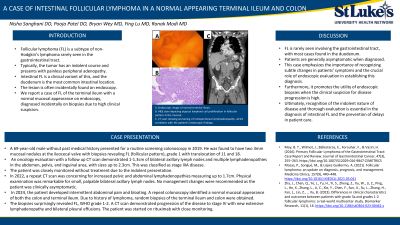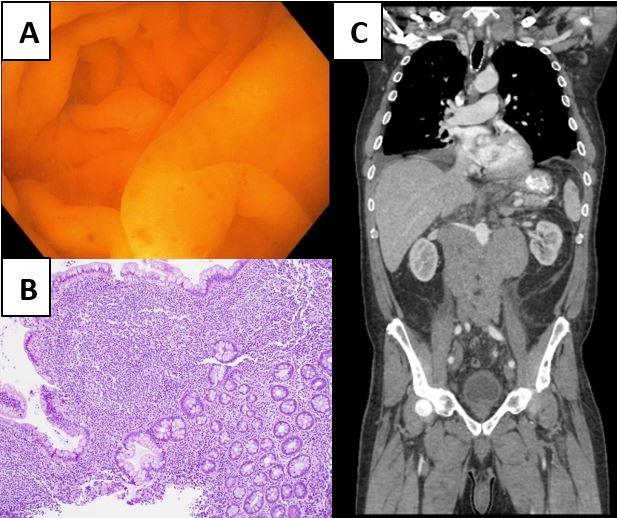Tuesday Poster Session
Category: Small Intestine
P5033 - A Case of Intestinal Follicular Lymphoma in a Normal Appearing Terminal Ileum and Colon
Tuesday, October 29, 2024
10:30 AM - 4:00 PM ET
Location: Exhibit Hall E

Has Audio

Nisha Sanghani, DO
St. Luke's University Health Network
Bethlehem, PA
Presenting Author(s)
Nisha Sanghani, DO1, Pooja D.. Patel, DO2, Bryan Wey, MD1, Ying Lu, MD3, Ronak Modi, MD1
1St. Luke's University Health Network, Bethlehem, PA; 2St. Luke’s University Health Network, Bethlehem, PA; 3St. Luke’s University Health Network, Bethelehem, PA
Introduction: Follicular lymphoma (FL) is a subtype of non-Hodgkin’s lymphoma rarely seen in the gastrointestinal tract. Typically, the tumor has an indolent course and presents with painless peripheral adenopathy. Intestinal FL is a clinical variant of this, and the duodenum is the most common intestinal location. The lesion is often incidentally found on endoscopy. We report a case of FL of the terminal ileum with a normal mucosal appearance on endoscopy, diagnosed incidentally on biopsies due to high clinical suspicion.
Case Description/Methods: A 69-year-old male without past medical history presented for a routine screening colonoscopy in 2019. He was found to have two 3mm mucosal nodules at the ileocecal valve with biopsies revealing FL (follicular pattern), grade 1 with translocation of 11 and 18. An oncology evaluation with a follow up CT scan demonstrated 1-1.3cm of bilateral axillary lymph nodes and multiple lymphadenopathies in the abdomen, pelvis, and inguinal area, with sizes up to 2.3cm. This was classified as stage IIIA FL. The patient was closely monitored without treatment due to the indolent presentation. In 2022, a repeat CT scan was concerning for increased pelvic and abdominal lymphadenopathies measuring up to 1.7cm. Physical examination was remarkable for small, palpable bilateral axillary lymph nodes. No management changes were recommended, as the patient was clinically asymptomatic. In 2024, the patient developed intermittent abdominal pain and bloating. A repeat colonoscopy identified a normal mucosal appearance of both the colon and terminal ileum. Due to his history of lymphoma, random biopsies of the terminal ileum and colon were obtained, which surprisingly revealed FL, WHO grade 1-2. A CT scan demonstrated progression of the disease to stage IV with new extensive lymphadenopathy and bilateral pleural effusions. The patient was started on rituximab with close monitoring.
Discussion: FL is rarely seen involving the gastrointestinal tract, with most cases found in the duodenum. Patients are generally asymptomatic when diagnosed. This case emphasizes the importance of recognizing subtle changes in patients’ symptoms and the crucial role of endoscopic evaluation in establishing this diagnosis. Furthermore, it promotes the utility of endoscopic biopsies when the clinical suspicion for disease progression is high. Ultimately, recognition of the indolent nature of disease and thorough evaluation is essential in the diagnosis of intestinal FL and the prevention of delays in patient care.

Disclosures:
Nisha Sanghani, DO1, Pooja D.. Patel, DO2, Bryan Wey, MD1, Ying Lu, MD3, Ronak Modi, MD1. P5033 - A Case of Intestinal Follicular Lymphoma in a Normal Appearing Terminal Ileum and Colon, ACG 2024 Annual Scientific Meeting Abstracts. Philadelphia, PA: American College of Gastroenterology.
1St. Luke's University Health Network, Bethlehem, PA; 2St. Luke’s University Health Network, Bethlehem, PA; 3St. Luke’s University Health Network, Bethelehem, PA
Introduction: Follicular lymphoma (FL) is a subtype of non-Hodgkin’s lymphoma rarely seen in the gastrointestinal tract. Typically, the tumor has an indolent course and presents with painless peripheral adenopathy. Intestinal FL is a clinical variant of this, and the duodenum is the most common intestinal location. The lesion is often incidentally found on endoscopy. We report a case of FL of the terminal ileum with a normal mucosal appearance on endoscopy, diagnosed incidentally on biopsies due to high clinical suspicion.
Case Description/Methods: A 69-year-old male without past medical history presented for a routine screening colonoscopy in 2019. He was found to have two 3mm mucosal nodules at the ileocecal valve with biopsies revealing FL (follicular pattern), grade 1 with translocation of 11 and 18. An oncology evaluation with a follow up CT scan demonstrated 1-1.3cm of bilateral axillary lymph nodes and multiple lymphadenopathies in the abdomen, pelvis, and inguinal area, with sizes up to 2.3cm. This was classified as stage IIIA FL. The patient was closely monitored without treatment due to the indolent presentation. In 2022, a repeat CT scan was concerning for increased pelvic and abdominal lymphadenopathies measuring up to 1.7cm. Physical examination was remarkable for small, palpable bilateral axillary lymph nodes. No management changes were recommended, as the patient was clinically asymptomatic. In 2024, the patient developed intermittent abdominal pain and bloating. A repeat colonoscopy identified a normal mucosal appearance of both the colon and terminal ileum. Due to his history of lymphoma, random biopsies of the terminal ileum and colon were obtained, which surprisingly revealed FL, WHO grade 1-2. A CT scan demonstrated progression of the disease to stage IV with new extensive lymphadenopathy and bilateral pleural effusions. The patient was started on rituximab with close monitoring.
Discussion: FL is rarely seen involving the gastrointestinal tract, with most cases found in the duodenum. Patients are generally asymptomatic when diagnosed. This case emphasizes the importance of recognizing subtle changes in patients’ symptoms and the crucial role of endoscopic evaluation in establishing this diagnosis. Furthermore, it promotes the utility of endoscopic biopsies when the clinical suspicion for disease progression is high. Ultimately, recognition of the indolent nature of disease and thorough evaluation is essential in the diagnosis of intestinal FL and the prevention of delays in patient care.

Figure: A. Endoscopic image of the patient's normal terminal ileum.
B. H&E stain depicting atypical lymphoid cell proliferation in a follicular pattern in the mucosa.
C. CT scan showing worsening of retroperitoneal lymphadenopathy, which correlates with the patient’s endoscopic findings.
B. H&E stain depicting atypical lymphoid cell proliferation in a follicular pattern in the mucosa.
C. CT scan showing worsening of retroperitoneal lymphadenopathy, which correlates with the patient’s endoscopic findings.
Disclosures:
Nisha Sanghani indicated no relevant financial relationships.
Pooja Patel indicated no relevant financial relationships.
Bryan Wey indicated no relevant financial relationships.
Ying Lu indicated no relevant financial relationships.
Ronak Modi indicated no relevant financial relationships.
Nisha Sanghani, DO1, Pooja D.. Patel, DO2, Bryan Wey, MD1, Ying Lu, MD3, Ronak Modi, MD1. P5033 - A Case of Intestinal Follicular Lymphoma in a Normal Appearing Terminal Ileum and Colon, ACG 2024 Annual Scientific Meeting Abstracts. Philadelphia, PA: American College of Gastroenterology.
